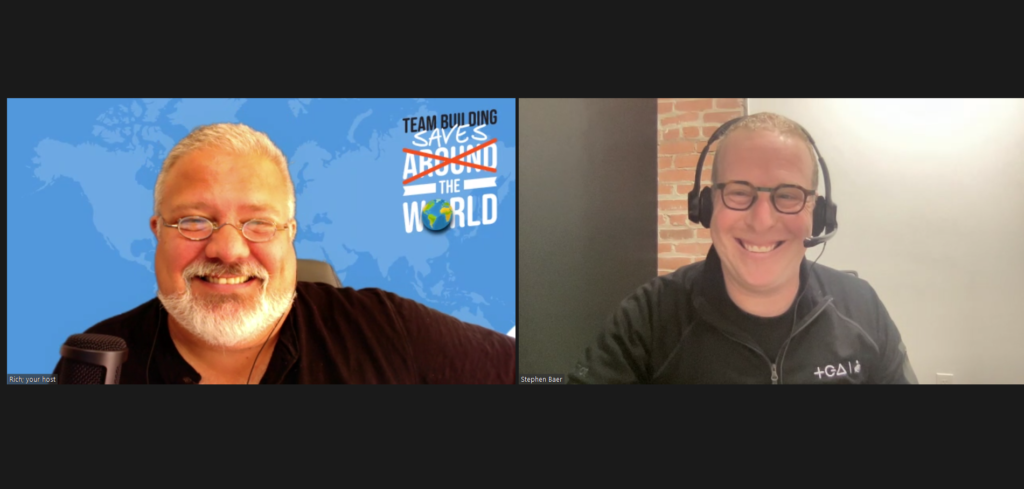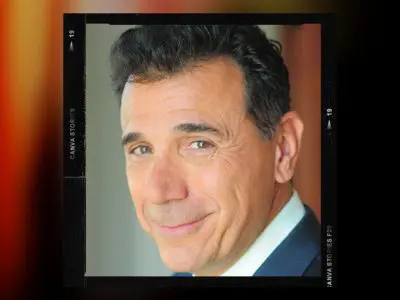Keeping Employee Engagement Fun
w/ Stephen Baer
Use the buttons above to listen now.
Transcript - Keeping Employee Engagement Fun
Rich: On this episode of team building saves the world.
Stephen: That’s the future for at least the next five years at which, which I wouldn’t have said three years ago,
Rich: I was just going to go there next, you keep ticking. All of my magic box,
Stephen: make the content really compelling, make sure that they can dive into it, engage with it, participate with it, see what we learn from it.
Right.
Rich: I think just having that, like you were calling it that safe space to fail is it will be a huge dynamic shift from what.
Stephen: Yeah, big, big time. And quite honestly, not only fail, but repeat and try again. And I think that’s really important.
Rich: once again, it’s me, your old friend, Richard Rininsland host of. Saves the world, the show where I speak to the leaders, the innovators, and the team building industry from all across the globe, trying to find out what about that. And its tree is so important, especially in the world of today. And today we’re talking about gaming and how it can help with employee engagement with the chief creative officer at the gaming agency, Stephen Baer.
But first I need to share some love with my supporters at team bonding. If your team is ready to experience teamwork, the power of play, the visit team bonding.com to learn more now. He’s joined me in welcoming the co-founder and managing partner of the gaming agency and the co-creator of the training arcade as well as a monthly contributor to forbes.com.
Mr. Stephen Baer,
Stephen that is a small supply of people. I keep trapped under my desk just to applaud you. That’s why they’re there. How are you doing?
Stephen: I’m really good. Thanks for having me. I appreciate it.
Rich: Thank you. Thanks for coming on. Listen, could you do me a favor? Just start off nice and simple. Tell my team a little bit about who you are and what it is you do in this industry.
Stephen: Sure. So my name is Steve Baer as you mentioned, about 15 years ago. I, uh, was one of the founders of a company called the game agency and. We make games, custom games, as well as turn key games to our platform called a training arcade for a combination of things, mostly K-12 and college education, as well as corporate training.
And my job in particular is really run all creative here. Uh, so I get to have a lot of fun focused on design storytelling. Engagement and different ways of just making our stuff more polished and interesting.
Rich: Excellent. You’ve mentioned the magic word of fun. A lot of people, when they think of gaming, the first income comes to their mind would be fun.
How is fun important in what you do?
Stephen: Well, so in particular, when you think about, uh, using games for purposes of training, which is often considered the exact opposite of fun, right? You want to make sure that you think about what mediums. That what we focus on to make it more interesting, right? So more fun some one’s having, the more times that they’re going to actually engage with it the longer, the more repetition and the reality is as a result of that, you’re going to see the content actually sticking.
So we have so many studies that talk about the more fun it is. The more they learn, the more they retain it. And then the more they’re able to apply on their day-to-day job. And that’s, that’s the whole goal.
Rich: How does that work? I mean, what is it about us playing a game that is so different from us? Just answering a questionnaire or sitting down and listening to countless people going on about, you know, the area we’re going to be working in the subject.
Matter of the employees.
Stephen: So I always boil it down to passive versus active learning. Right. So if you’re going to sit there and watch a video, or you’re going to read some content or, you know, or, or otherwise, um, a lot of it’s going to pass right past you, right? Because you’re not actually actively engaging with the content, but if you’re playing a game and you’re required to, and one of the things I love about, you know, the work that we do with team bonding is you’re required to actually participate.
Right. And by participating, you’re going to get the information you’re going to engage with the information and you’re going to retain the information. So, yeah, it’s a big difference between passive and active,
Rich: but how does it work,Can you give me an example of what it looked like before. I mean, what kind of training processes or just even employee retention.
Stephen: That we, we, we do, uh, and I’ll, I want to pull up a chart if I can during this talk, but we talk a lot about, um, the traditional passive that we discussed. Right? And you look at a lot of the, um, media types, whether it’s reading or watching videos or living listened to lectures, and you’re seeing it within a 30 day period, 85, 90% of what you learned.
It’s gone. It’s gotten there that we don’t, we always talk about what a crazy, uh, media filled world we all live in. And there’s so many messages that we’re getting every day that why would this thing that I learned in a book a month ago, stick with me, you know, versus the 5 million things that I’ve read or heard since then.
Right. So. That’s the old way of doing stuff. And, you know, one of the things that we’ve focused on really over the last almost 15 years is trying to make it a much more active experience. And the neat thing is, is we’ve seen a few things. So, you know, in particularly the work that we do with, um, uh, team bonding, Uh, in our platform, the training arcade, um, we see a few things.
We see that people come back and they play our games. Uh it’s we did a study of, I think 2,500 games, and we saw that 57% of people came back and they played each game three or more times. Well, that’s pretty amazing. Right. And not only that it’s great that they came back. They enjoy. But we saw it. I hate the fact that these stats are so similar, but of those 57%, there was a 58% growth in knowledge between the first time I played.
And the third time they played. So we actually stuck because you’re reinforcing the information, you’re giving feedback to someone you’re saying, oh, you got that wrong, but here’s the right answer. And here’s why, and don’t get an extra few points if we get this right. And the whole point is you make it a fun, immersive, engaging experience
Rich: What does that give you?
I mean, what does it tell you when your end of the spectrum? Cause you’ve got the employee, the employee is going in there playing the games though. Learning they’re retaining all great. But what does it tell you about.
Stephen: Well, I think it depends on the type of game, right? So, you know, there are some games that are focused on, Hey, this person just, um, is really good at recall.
Okay. That’s good. That’s important that they know the information, but you might also want to think about games that are going to tell you about soft skills, right? This person is really good. And they, uh, as we’re seeing in the way that they’re interacting in this game, they have the skills to be in sales or negotiations or customer service.
Or you might look at something and say, well, this type of game requires them to do a little more strategic you know, deduction, right. Might want to say this person has the ability. They might be management quality, and there are all different types of game mechanics that can give you lots of ideas about what skills somebody is good at, what behavioral trends they have.
And it’s not just about what they know. It’s how they behave. So once you’re able to take the combination of those two things, you can really optimize your workforce. And you can say, you know, this person maybe needs these skills. I need to upskill them in this area. Or this person really excels in this category.
I need to move them into this type of job role because gosh, they’d be perfect in a sales role based on the things that I’m seeing, the way that they are engaging in this soft skills game or.
Rich: When, you know, before the world changed almost two years ago now, certainly a year and a half, rather when I was doing things live, I could tell, cause I, I focused a lot on those puzzle games.
A lot of them on those, a escape room type of, of, you know, events. And I could tell you within the first 15 minutes, which team was going to win, they were going to be the first ones done the first ones to get it all correct. And I always said that I could tell, because I could tell which one has natural leadership working within their group, somebody who is keeping everybody motivated, keeping everybody moving and can see and get rid of the superfluous. Is that the kind of thing you look for or that you can.
Stephen: Uh, I think that was one of the things you can see. And I think that’s a great example, right? Because you’re, you’re quickly seeing someone’s behavioral skills, right.
You’re able to see the way that, that the way that teams interact. And that’s one of the great things about games, right? Games can be a single-player experience. It could be. And you sit here on those silo and you experienced this and I can tell, you know, the decisions you’re making and the, you know, the, the, the, the results of their decisions and, and how that impacted your next decision.
So if, or I can put you in a group like you’re talking about and see how people are relating to each other, uh, bubbling up as a leader of that team. Um, and you know, whether there’s, uh, you know, uh, friction between people, whether people are collaborating or they’re competing with each other, um, and, and quickly to your very point, Within just a few minutes, you can quickly, uh, guess how they’re going to perform,
Rich: because I’ve also seen that, that competitive side come out and usually it starts off with our teams better than your team.
We’re going to be you, but that can quickly turn on the team itself. So looking at things like that, what kind of education do you think that the employee will need going forward for?
Stephen: Uh, well, I think that, let me make sure I understood the question correctly because you know, when I think about the things that the games can tell, I think they can tell, um, very quickly one does this person do, do these players have the ability to collaborate with each other, right.
Um, do do. Do they have good listening skills? Do they have good observation skills? Um, are they applying those properly? Right. Um, and I think that your example of a escape, the room is a perfect example for something like that. But, you know, there are all sorts of games out there, right? There are other types of puzzles where you’re, you know, basically, you know, looking at process or you’re looking at, uh, identifying, um, categorization or you’re thinking about, you know, just basic trivia.
I think that’s. Some late and some don’t to Zach, what we’re talking about here. And I think the wonderful thing about games is I don’t really, they fun. And not only do they give you lots of ideas of who the person is, but they give you so much data behind the individual behind, you know, what they know, um, how they behave and you can quickly take that data and say, all right, a few things.
Quickly I see in this room, 30% of their people don’t understand this. Let’s stop and talk about it. Okay. That’s one thing you could do. You could also say, Hey, I see that this person over here, or this team over here, they, they negotiated the heck out of this situation just perfectly let’s stop and have them tell us about why they did what they do.
Right? So not only can you celebrate what someone’s done, but you can really lift them on a podium and that. No really act as a, as your second, uh, instructors to the group as to why they did what they did and why it worked. Right.
Rich: But now you’re talking about seeing games because what I largely work in is games in group dynamics.
If you want, because being in team bonding, everything is about building up and showing them where they fit within that. What about individuals, individual teams, people who are just, you know, th they’re gamers going on your website and just playing a game for themselves. Are we getting the same? Do we get the same kind of skill base?
Do we get the same kind of differentiation of their personalities?
Stephen: Yeah, you sure do. I mean, it depends on the game you’re playing. So if you play, you know, our scenarios game, which is a branching dialogue, if you could go down to any type of path, so it could be sales training, it could be customer service. To me, it could be negotiation training, putting them in different situations and then quickly seeing how they perform.
And the nice thing is, is that with the game-like scenarios, they’re going to not only see how the performance. But you’re going to give them an opportunity to refine their decisions based on the feedback they get. You also allow them to go back and look at the history of how they performed or how they’ve answered something.
So they can kind of hopefully analyze, well, hold on. Should I be going down a different route? So that’s one type of game then there’s games like detective gate, which is about more or less about a choose your own adventure and more about analyzing a situation, right. Where you might say. Well, what’s the root cause of this situation or we don’t.
Why, what is the impact of this company versus this company at work this group versus this group, and having someone look at the whole picture and really identified the strategic side where something’s going and why it’s going that way. What are the right decisions to hopefully right. Size the situation.
Right? And those are two good examples in my mind of an individual can kind of jump into a game like those. And those could be on any topic. Those could be on hiring people correctly. Those could be on mergers and acquisitions. Those come beyond, you know, change management. I mean, it’s, it’s just, it’s all sorts of different things.
You can focus on
Rich: the Stephen if you can’t hold on for just one second. Because we’ve been talking about them all along, but I do want to make sure and tell my team out there about a company I’m very proud to be a part of team bonding team bonding was founded over 20 years ago with one simple question.
How can employees have a great time while fostering strong, authentic bonds between people who work together? They’ve created a catalog of innovative events using the power of play as a learning tool and tapping into the correlation of work and. From scavenger hunts to jeopardy and so much more the team bonding of activities live virtual and hybrid maximize the impact of the team.
Building with an accent on fun. Visit team bonding.com to schedule your event. Now, team bonding when you want seriously fun results. And we’re back with Stephen Baer talking just about that kind of gaming and how it affects your employees. So in the live read right there, I was also talking about the live virtual and hybrid.
What do you think works best, Stephen? I mean, you’ve seen all of it by this point, you know,
Stephen: I think we’ve, we’ve all learned a lot over the last 18 months. Uh, and we talk about this a lot is that you think about it doesn’t matter what company, uh, people are at. People are so burned out at this point, um, because they assured sheer exhaustion of trying to navigate through this entire pandemic.
Right? So the, the amazing thing is, is that I feel like virtual games have, you know, really. Change the way that people interact with each other, because they’ve just been forced to do so from the, you know, from the comfort of their homes and actually, you know, find the little ways of actually interacting, engaging, bonding with their colleagues.
Right. And so I think that it’s a, there’s been a behavioral change period in the way that people interact with them. So I think that one, people have morphed to being comfortable with using games. I will say that, uh, you know, after, you know, 22 months, I finally went back to a trade show, this film with, uh, ATD.
And, um, at that trade show, it was amazing to just see people in a room together, engaging with each other. Um, you know, I think that people miss. Uh, you know, everyone’s masked up still and on it, hopefully got vaccinated, but nonetheless it’s like, it’s the reality is, is that I think people are yearning for that experience.
Again, we’ve seen. And I, you know, I, I think that this is where it gets really creative organizations that are figuring out how to do the hybrid experience. Uh, I think are the ones that are going to. Really be the winners in the long run, because I don’t think it’s going to be one or the other for a very long time.
The end of the day, people are trepidatious about getting back to what we knew two years ago. And I think that if I were a betting man, which I am, uh, I wouldn’t say that, uh, you know, the hybrid experience is really what needs to be optimized. And so. You know, to me what that means. And I’ll just use jeopardy as an example.
Cause you mentioned that earlier, um, is really understanding not only how to engage an audience in-person as well as you know, from afar, but having the technology to do that too. Right? Because you want everyone to feel included. We want everyone to feel like they are. Just as important, regardless of where they’re located.
If you want everyone to feel like they’re engaging with the content at the same time, at the same speed and that they’re working with the facilitator, we’re, you know, they’re, they’re a team where their competition and they feel like they’re part of it. So I think to me, That is where the money is. I think that’s where, and I don’t mean the, you know, the dollars.
I mean, that’s, I, in my mind, that’s where people need to be focusing their efforts because that’s the future for at least the next five years at which, which I wouldn’t have said three years ago.
Rich: Okay. But what do you see? What do you, what do you hope to find? Uh, as, as we go through. Because, like you said, this is not going to change things.
You know, even if God willing, we lose the whole COVID element, within the next year. This is now a working model and people, we we’ve talked on this very podcast about the great resignation we’ve talked about. People have, you know, moved entire their entire family from one location to another because they wanted to get away from the congested city life that they have.
But now they don’t want to go back.
Stephen: So not only that I want to go back, but you know, we were just talking about this earlier today, uh, in our own company, right. We’re working on a, you know, a company-wide meeting. Well, it’s 150 people I’m trying to think about. Who the heck actually wants to go travel anymore.
Right. So, you know, while I, you know, a few years ago we would go, go down to key west or to Ohio, California or Phoenix or somewhere fun as a big group. Yeah. Everyone says I’m okay. I’ll just stay at home. So how do you engage that person? How do you make them be like, they are. Really, uh, an important part of the community.
If you can’t take them out to drinks, if you can’t, you know, do some, some sort of team bonding thing with them in person, you need to think about the ways to make them feel like they are really part of your culture and it’s ongoing. So maybe that is, you know, finding that, that weekly happy hour that you do as a team and trying to make sure that.
Support people. And then one of the things to also think about is sometimes it’s not just about a game or an experience, right? So we talk about the, you know, the difference between games and gamification. So I kind of just sort of bring to your listeners who don’t know the difference. I think that it’s really important to think of.
Uh, game is something you’re going to just hop in. You’re going to play and you’re done. You might come back and do it again. Right. But a game of education experiences, really looking at holistically, uh, levels of competition points, badges, leaderboards prizes, and trying to make sure that you think about, um, all sorts of things that.
Uh, actually drive those things, right? So it may not just be playing a game. It might be watch these many videos, do these tasks. I mean, this material, you know, I’m logged on to the network and, you know, uh, share some best practices with your colleagues, but ways of actually motivating and activating your employees or your audience to do anything.
And I think that’s one of the things that companies are more and more thinking about. How do we use gamification as a whole. To engage people, regardless of whether they’re in our office, in our homes or elsewhere. Yeah.
Rich: Excellent. Because I was just going to go there next. You keep ticking all of my magic boxes here, because I wanted to talk about the employee culture.
I have been at this job with team bonding since 2009, myself, and I’ve seen it where we get the return clients who every six months, every year would get their people back, back together. Again. You know, would fly me out somewhere and I would get together with all their management level people and we would do a fun event together, so on and so forth.
How can gaming actually assist with the full culture? ’cause like you say, it’s going to be, the successful company is going to be the one that can actually navigate between being live together, being virtual or a combination of the two,
Stephen: the last two years have been incredibly pivotal for us as a business.
As you kind of imagine gaming distant, you know, experiences, virtual experiences, um, have just been, you know, on fire. And so in addition to building out. First of all gameplay. One of the things that we built and launched him have seen a lot of adoption is what we call our arcade. And so our arcade plugs into any website plugs into any learning management system.
And it kind of goes back to what I was saying earlier, which is the companies that are really adopting. Ways of engaging their employees, motivated employees, activating their employees are giving them daily, weekly, monthly tasks to do. And really dangling that carrot, if you will. Right. It’s thinking about what things do we want you to.
Way to do to better yourself to improve your career or to improve your division, you know, and, and so on, so forth. And it’s not just about, you know, we want you to drive more sales or it’s not just that we want you to take this course. It might, it’s not just that we want you to share best practices that we have this whole variety of goals that we want you to do as an employee.
And thinking about giving an ecosystem where you can drive that and motivation. Um, whether it’s intrinsic motivation or extrinsic motivation, really motivating that employee to participate in the, in the greater cause if you will.
Rich: Okay. Where does this start for an employee?
Stephen: I think that the neat thing is that it not only is a story.
It’s a new employee in the onboarding process, but it really there’s so many touch points, right? So to me, you can really take something like this concept and apply it from the day one that someone starts at the company with onboarding, then making sure that they understand the culture, making sure they understand the products and the processes and the services and all that type of stuff.
But you can really layer this into a whole variety of things. So whether you’re training, you know, Sales training or your training on compliance training or your training or your training on diversity inclusion? The whole point is, is make the content really compelling, make sure that they can dive into it, engage with it, participate with it, see what we learn from it.
Right. And also make it a safe place to fail. You know, the end of the day, people don’t like to look bad in front of their colleagues. They’re in their own little ecosystem. They can try stuff out. They can see what works they can. Um, make sure that they hopefully are getting smarter and better in a safe zone and in a zone where they’re gonna be motivated to.
So whether it’s, you know, based on prizing or experiential or, or otherwise, I believe that our weld a well-built gamification program is going to be sprinkled throughout someone’s career and throughout, uh, throughout the journey that someone has had a company. Um, it’s not just something that’s a one stop
like a game. It’s something that it should be part of the employee.
Rich: Okay. So tell me, let’s say that I’m a manager or even a CEO. Tell me why I should be making this a part of my everyday for my employees, because everything was fine up until a year and a half ago. Now you’re telling me I need to do this. So why,
Stephen: so, yeah, so I think that the big, why is that one people are burned out. They want a level of motivation. They want a level of engagement. Um, you know, the, if you, as you talked about earlier that the great resignation, what is it like 40% of the, you know, people in this country who say that. Have either quit or they plan on quitting or they’re thinking about quitting.
Right, right. That’s why you need to change things. It’s not where we were two years ago. Right. So, okay. Well, what is the form of motivation that you can do? What’s the form of way of getting people to interact with each other, compete with each other, collaborate with each other. It’s kind of got two things on our head and think about what were the things as children that move us to do certain things, those things, those, those instincts haven’t gone away, but we’re now in a much more structured environment at corporate environment
maybe we need to bring some fun back. Maybe we need to make sure that we’re having people engage with each other and content, and we’re incentivizing them to do the things we want to in a new way. Right? No one wants to read a PowerPoint. No one wants to watch a, you know, an hour long video, no one wants to read a, you know, a 200 page manual.
It’s just that people don’t want, don’t want to do that. And so you have to think about meeting people where they are. Um, so you know, whether it is. You know, taking games that are obviously interesting to people, whether it’s taking a micro content, which is digestible by people, whether it’s incentivizing them with prizes and incentivize them with, uh, you know, experiences, I think you just need to meet people where they are
Rich: today.
What kind of examples do you have? I mean, you, you talked about the, uh, the detective game, which immediately that inspired me to want to know more, but what, what kind of games do you offer and what are they. I mean, what can I learn about myself is what I’m looking for.
Stephen: Yeah. So we, we break our games down into a few different categories.
So I’ll start with things like just basic recall. Okay. So, you know, recalls less about, it’s going to teach me, uh, you know, about myself. It’s going to help me understand what I know and what I don’t, and it’s going to reinforce the stuff that I don’t know and teach it to me. Right. Games in my mind are, should be used less for just assesment but also as a teaching opportunity. So let’s under that category of games that we have, where we call. Uh, you mentioned earlier, we have the, the official light licensed to jeopardy, and we’ve been working with Sony productions on that for the last few years, how that is a single player game, as well as, uh, you know, uh, audience facilitated game group play.
We also launched a gimme about half a year ago, uh, wheel of fortune. Uh, and that’s been a wonderful game. And the reason I like those. Is despite the fact that there are 35, 40 year old intellectual properties, right? They are they’re properties that everybody understands. Everybody knows everyone’s comfortable with.
And you know, the last thing you want when it comes to a game is for someone to be trepidatious about getting in a plane. You want someone to be able to pick it up, play, feel comfortable and hopefully have. Right. So, so those fall into that category. We also have other games that fall into the recall category, like an endless jumper.
So if you’re familiar with doodle jump and your jumping from platform to platform, answer the questions. According obstacles that one actually has. And it talk about the fact that they have some of our games have three or more replaced. That’s a. Uh, north north of sixth street plays on average, which is great because it’s just more gamey right?
We have a game called match, which is very similar to candy crush, you know, basically swapping images or answering before and throughout the levels, different questions. So those are all recall games, right. But then we also have the games that are like scramble games, where you have to basically drag and drop different things into different categories.
Gotcha. Categorization process. We have those soft skill games, like. The scenarios that really, I helped to understand more about the person’s behavioral output. We have the strategy games like detective. I think we have 10 games altogether, and they’re really meant to focus on a variety of both a business objectives, as well as, uh, you know, personal and professional objectives.
Rich: You mentioned that person who has a little more trepidatious about getting involved in these types of things, and I’ve seen it throughout my entire. Where you will have, as people are coming in, the excited gung-ho, let’s go, let’s do this. You’ve got the eye roller, but they’re still going to play along. And you’ve got the people who just sink into the background and don’t want to be noticed.
How do these games. Get all those types, the different types of players involved.
Stephen: Well, the first thing is making sure that they’re easy to pick up and play, right? So then a day we don’t want to have a game that, you know, they’re, they’re the, the person who’s the let’s do this. Let’s do this might be someone who’s been playing games forever and, um, is comfortable picking up a deep simulation.
We’re not going to start there, right. Because that’s not for everybody. Right. So making sure that you have games that are easy to understand, easy to play. I have a little forms of a word along the way. Right. So, you know, and also little forms of pressure along the way. Right? So you want to make sure that all the games have time challenges.
You want to make sure that they have things like they’re celebrating streaks. If you’ve got 300 row and make sure that you’re talking about that, make sure you have animations that pop up that are just kind of interesting and, you know, have a sense of whimsical, you know, humor to them, right? The more that you can actually relate to a person and engage them on a one-on-one basis.
Um, I think it’s really important. So we try to make sure that our games are easy, are fun. Certainly pull people out of their comfort zone a little bit, but give them a safe place to fail. If that makes sense. Sure.
Rich: Do you see this type of philosophy of gaming actually going forward and changing the environment itself or just helping to improve the employees place?
Stephen: Well, I think that the, I think that the games themselves are going to help somebody understand the content, prove that they understand the content, apply that understanding to the content. So, yes, I think that that last part, the application, I think that will change, you know, the outcome of a particular organization or situation that’s one, but when it comes to gamefication, I feel like that as a whole.
Can change an organization. I think if you have lots of people rowing in the same direction, doing certain things. And once again, it’s about gamification. It’s less about a game it’s about taking, you know, real world situations and, uh, incentivizing and applying game mechanics and game theory to, uh, to, to other situations.
So if you’re able to take game theory and game components and say, We want to make sure that we’re incentivizing and motivating our employees to do certain things. That’s going to change that company. That’s going to change the, um, the culture that’s going to change the outcome.
Rich: I think just having that, like you were calling it, that safe space to fail is, is, will be a huge dynamic. From one time before,
Stephen: big, big time. And quite honestly, not only fail, but repeat and try again. And I think that’s really important, right? I mean, at the end of the day, you don’t want someone to say, well, I got that wrong too bad. You want someone to say I got that wrong, but I think if I try again, I could get it.
And then the good thing is if they get it right in your virtual world, hopefully we’ll get it right in the real world. And that’s what any company wants. They want their employees to be successful in the field, on the job. So why not have them spend whether it’s five minutes or 15 minutes playing a game and really digesting the content, trying out different skills so that they can apply in the real world and be successful.
It ultimately is going to save a company or make the company a level of money.
Rich: What about the higher up. Where do they exist in all of this? Are they going to be part of the process as well? You’re looking at management level.
Stephen: Well, yeah, I mean, so we see that the management teams, uh, engaged on two levels.
So the first level is because these games are so data rich that gives management a real indication as to what people know and how they behave. So I think, you know, the nice thing is when you think about traditional training and employee engagement overall, You know, there’s not that much data that can be succinctly provided to management to help them understand their employee base.
So that’s the first thing, and I think that’s really important, but it’s not just, you know, for them to still deploy training for their employees and say, we’ll sit back here and watch and, uh, good luck with everything. And then the day, I believe that all employees, whether you’re, you know, right out of school and first day on the job, or you’re, you know, 40 years into your career.
And then the day we all have room for growth. So, you know, it may not be a recall game. Maybe it is, but maybe it’s about a management training game. Maybe it’s about soft skills. Maybe it’s about figuring out how to negotiate better. Maybe it’s figuring out how to manage better. Maybe it’s figured out how to analyze better at the end of the day.
I there’s, there’s a game four in my mind. I game mechanic in my mind, for all, all forms of all periods of your career, um, all genders, all age, I think that just finding the right ones, that match that person. Right. And that situation.
Rich: Okay. Let’s look to the future a little bit. Where do you see the gamification progressing and what kind of benefits can we look for?
Stephen: So I would say that two years ago, Um, pre pandemic, there are certain pockets that games for free. I mean, sales training is probably the best one, right? So it’s a very competitive nature. But we found is, is that as a result of, uh, so much moving to a virtual world and, and tryinh to figure out how do we engage people?
As a whole and keep people motivated to participate in the company overall, where I’ve seen is, is that today we have several hundred companies that several million learners on our platform. And what’s neat is, is that you can use gaming for so many different things. Let’s, let’s look at a few examples.
We have a number of call centers using our games, um, to engage their employees. And, you know, it’s. That a call centers. They share something that a lot of companies have, you know, whether it’s retail or quick service restaurants or whatnot, they have incredibly high turnover. So how do you make sure that you, as you have new employees coming in web to understand the product, they have to understand service understand process.
And by the way, you got five days to train them on all. And you want to rinse and repeat. You want to make sure that that’s easy. So I think that’s, that’s a really easy area thinking about if you’re, if you’re a large company, we’re going to have high turnover and you have potentially people who are looking to, or not looking to, to read long manuals and, you know, go through long videos and.
That might be a great way to engage with the content. So that’s, that’s a starting point, but then, you know, we also take it to a totally different spectrum. We see management consulting firms using games right. We talk about thinking about, you know, how do you really, this comes down to a soft skills and strategic skills.
Okay. And really understanding situations and going through different simulations. Right. Understanding what the repercussions of their decisions are. And that could be anything from, as I mentioned earlier, change management or thinking about growth strategy. We’re talking about positioning overall and there’s lots of gaming clinics that can really simulate those situation.
So I, you know, I think the neat thing is, is that companies are seeing that the more that they can have someone really get behind a screen and try something in a virtual role and learn from it, they’ll be able to apply those, uh, those skills that they’ve gained in the real world and ultimately saving or driving a lot more
Rich: revenue to the company.
Thank you so much, Stephen. This was a fantastic conversation. Thank you for coming on and being a part of it. I wish I could go. For another easily half hour, but that’s a long podcast. We don’t want to force anybody to sit through that, but listen to them, but please put your hands together. One more time for Stephen Baer
stephen, can you tell my team out there where they can find you and more information about.
Stephen: Yeah, by all means. So if you come to the the game, agency.com, that’s our services business. And if you go to the training arcade.com, that is our product. And I encourage you to take a look at it. Also just, uh, we, we love working with team bonding.
They’ve, we’ve been partnered with them for the last few years. So, um, you don’t have to come directly to us and go direct to them as well. We do it and do events, but I appreciate the opportunity to chat and always passionate about the topic. So thanks for.
Rich: Yeah, no, it’s a great topic. It’s a great conversation.
And it’s something that I hadn’t, I mean, even being in this business, I hadn’t thought about where it’s going to go from here. So thanks so much for coming on board. Um, kind of sucking up to you a little bit right now, Steven, just so you know, because as I told you before, It’s time for my speed round
they gave me this great soundboard. So I got to get all the cheese. All right, my friends. So this is how this is going to work in 60 seconds. I’m going to ask you a series of innocuous questions. You just give me the fastest answers you can’t. The idea is to answer as many questions as possible within 60 seconds.
If you are feeling competitive at all, if that is what your nature is, when it comes to. The number to beat is 13, 13 questions. All right.
Stephen: Can I ask you what? So am I getting that into the answers? That’s what I really want to know. Well, I knew any of the answers to this or no,
Rich: it’s all, it’s all about you.
This is all Congress dissolved, like conversational, quick answers. For you. So yes, you will know all of these. It’s not like I’m going to ask you, like, what did I eat for breakfast today?
All right. So with that in mind, as soon as you hear the music, I’ll ask the first question and away we go. What’s your name?
Stephen: Steve Baer.
Rich: How many kid do you have?
Stephen: Three
Rich: which one’s your favorite
Stephen: Arlo?
Rich: Hey, if you could time travel, where would you like to go?
Stephen: Turkey 1932.
Rich: Okay. Uh, what’s your favorite ice cream flavor?
A nice best childhood memory,
Stephen: a snow blowing business. That was my first business.
Rich: Excellent. Favorite holiday. If you could eat it. Food if for the rest of your life, what would it be?
Stephen: Chicken.
Rich: If you could be a cartoon character for a week, which one do you like to be?
If you could have dinner with anyone from history, who would it be?
Stephen: Oh gosh. Uh, oh, no. Um, okay.
Rich: Uh, favorite childhood book,
Nancy drew series.
The leader or follower leader. Ah, I’ll give it to you. I’ll give it to you. Are you ready? How do you think you did?
Stephen: I think I got 13.
Rich: Do you think, so you actually got my friend.
11 correct correct answers. I say correctly, if you,
Stephen: the back in the
Rich: history and it was, it was Z. You got to have these things ready to go, buddy. That’s how you do it. Airbrake
Stephen: you have something to aspire to. So you motivated me.
Rich: Good. Well, hopefully we’ll get to have you back sometime soon so we can see if you can do that.
But for now, ladies and gentlemen, please, one more time, a big round of applause for Steven Behr. Thank you so much for coming on board,
but that’s it gang. It is one more time to wrap up team building saves the world. If you’re new to the podcast, just happen upon it, or you’re an old fan of the podcast. Thank you so much for coming on and listening to us today. Please share this information with everybody that you may know, whether they’re a coworker.
A friend, family member. We would love to spread the news of this really important topic to the world. Also, if you’d like to find out more about us, you can look@allofourpreviouspodcastsatteambonding.com forward slash podcast. You can also find it on Spotify, Google, wherever you find your favorite podcasts, we will be there.
We’re also on all the social medias at team bond podcasts. So please go ahead and click on it and, you know, learn about us and leave a comment that I could possibly read in future episodes. That would be great. But for now my friends, that’s going to be it for me and another episode. So thank you so much for coming on board with us.
I hope you’ve enjoyed yourself as much as I’ve enjoyed being here and always remember my friends, no matter where you are in the world, you are. Part of my team and I am forever going to be on yours. Enjoy the rest of your day guys. And I’ll see you next time.
Stephen: It’s been said that you learn more about a person in an hour of play than in a year of conversation. So why not put your coworkers to play with the help of the team at team bonding team bonding was founded over 20 years ago with one simple question. How can employees have a great time while fostering strong, authentic bonds between people who work together?
Their catalog of innovative events include scavenger hunt, jeopardy, and much more each activity, whether it be. Virtual or hybrid maximizes the impact of team-building with an accent on fun. Visit team bonding.com to schedule your event now, team bonding. When you want seriously fun results.
October 18, 2021
Gamification of employee training is one of the better ways to keep your remote or hybrid team engaged and motivated.
With the Great Resignation continuing, hiring and training new team members is key. New hires will find out about the workplace culture pretty quickly. Why not keep it fun? Stephen Baer offers insight into how gaming can be a great tool to improve employee engagement and make the workplace a healthier and happier space. Gaming can help show employers how their team collaborates, takes on new challenges, and shine a light on potential leaders all while creating a positive and engaging workplace culture.
Stephen Baer: Stephen is the Co-Founder and Chief Creative Officer of The Game Agency (an educational software company recently acquired by eLearning Brothers), a monthly contributor to Forbes.com, and a regular speaker at EdTech conferences. For 15 years Stephen has been creating game-based training strategies and solutions to educate and activate audiences. Since 2007 The Game Agency and their SaaS platform (The Training Arcade®) have developed award-winning games for new-employee on-boarding, sales and product training, leadership development, safety, security, compliance, systems & processes, customer service, and many other training topics. They have also helped shape the education industry and disrupt traditional learning methods with the creation of interactive games focused on Social Emotional Learning, S.T.E.M. Education, Financial Literacy and Diversity, and Health & Wellness, which have been played by millions of students worldwide.
" The whole point is to make the content really compelling, make sure that they can dive into it, engage with it, participate with it, see what we learn from it. Right? And also make it a safe place to fail."- Stephen
Get more human resources and leadership advice.
Less drama? Greater teamwork and job satisfaction? TeamBonding is here to help you build a stronger and happier team. Subscribe to get our team building podcast and thought leadership blogs sent straight to your inbox.















